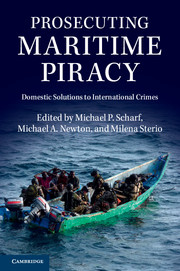Book contents
- Frontmatter
- Contents
- Contributors
- Introduction
- PART I DEFINING THE CRIME OF PIRACY AND ESTABLISHING JURISDICTION OVER THE CRIME OF PIRACY
- PART II THE PURSUIT, ARREST, AND PRE-TRIAL TREATMENT OF PIRATES
- 5 The Use of Force against Pirates
- 6 The Use of Force by Private Parties against Suspected Pirates
- 7 Transfer of Suspected and Convicted Pirates
- 8 Pirates' Right to a Speedy Trial
- PART III LEGAL ISSUES IN DOMESTIC PIRATE TRIALS
- PART IV SENTENCING AND POST-SENTENCE TREATMENT OF CONVICTED PIRATES
- Conclusion: Is There a Case for an International Piracy Court?
- Index
7 - Transfer of Suspected and Convicted Pirates
from PART II - THE PURSUIT, ARREST, AND PRE-TRIAL TREATMENT OF PIRATES
Published online by Cambridge University Press: 05 June 2015
- Frontmatter
- Contents
- Contributors
- Introduction
- PART I DEFINING THE CRIME OF PIRACY AND ESTABLISHING JURISDICTION OVER THE CRIME OF PIRACY
- PART II THE PURSUIT, ARREST, AND PRE-TRIAL TREATMENT OF PIRATES
- 5 The Use of Force against Pirates
- 6 The Use of Force by Private Parties against Suspected Pirates
- 7 Transfer of Suspected and Convicted Pirates
- 8 Pirates' Right to a Speedy Trial
- PART III LEGAL ISSUES IN DOMESTIC PIRATE TRIALS
- PART IV SENTENCING AND POST-SENTENCE TREATMENT OF CONVICTED PIRATES
- Conclusion: Is There a Case for an International Piracy Court?
- Index
Summary
INTRODUCTION
For countries whose commercial ships must navigate major trade routes, piracy has become a major concern. As a result, the international community has begun to search for solutions for how to prosecute and detain these criminals. Countries whose ships must traverse both territorial waters and the high seas want to protect their interests, but various legal and practical issues, such as evidentiary problems and the fear that these criminals will remain in the prosecuting country after the trials cause them to be wary about prosecuting pirates in their own courts. Consequently, patrolling naval states that seize suspected pirates rarely commence criminal proceedings against those pirates. Rather, the nations that have detained suspected pirates typically transfer detainees to other countries that have expressed a willingness to prosecute pirates in their courts. Such transfers occur either informally or through formal transfer agreements.
Certain Indian Ocean regional states, including Kenya, Mauritius, Tanzania, and the Seychelles, have been willing to receive suspected pirates, and they provide detention facilities and a court system to conduct the proceedings. In practice, transferring pirates to and from these regional states has presented many challenges, such as preserving evidence, providing adequate health care and security for prisoners, and dealing with the complexity of criminal prosecutions. Reported human rights violations in the receiving countries have led to debates about what duties are owed to pirates by the capturing countries and when and to where those countries may transfer pirates. Despite these debates, the “regional forum” approach has proven to be the most effective way to deal with the problem. In 2012 and 2013, substantial progress was made in regional forum states with the assistance of the international community, and in particular, the United Nations Office on Drugs and Crime Counter-Piracy Programme, which “is providing prisoners convicted of acts of piracy with welfare support, transferring and repatriating individuals suspected or convicted of acts of piracy to their homelands, supporting released hostages and training police and coastguard officials, as well as judges and prosecutors” and “ensures access to defence counsel for individuals suspected of piracy during trials in Kenya, Mauritius and Seychelles through the provision of funding to Government legal aid lawyers or non-governmental organizations.”
- Type
- Chapter
- Information
- Prosecuting Maritime PiracyDomestic Solutions to International Crimes, pp. 150 - 171Publisher: Cambridge University PressPrint publication year: 2015
- 2
- Cited by



